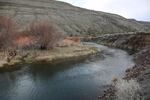Just as a surge in COVID-19 infections appears to be subsiding, parts of the Warm Springs Reservation have no running water.
About 35 residents have been affected since May 21, according to Warm Springs Emergency Manager Danny Martinez. “It’s mostly elders,” Martinez said.
Related: The Cost Of Clean Water In Warm Springs
Tribal officials are providing drinking water through a roadside tank, and advising residents to bring their own containers to haul it. Portable toilets are in place near the homes, but a week after the outage began, Martinez was still trying to arrange mobile showers.
With so many people working remotely due to the pandemic, Martinez said it’s been more difficult to get his calls returned by government agencies, contractors and tribal departments.
According to Warm Springs' community radio station KWSO, the tribal public utilities department hopes to have water running again early next week, noting that the long-term solution would be installing two new pumps with new motors and upgrading the electrical system.
The outage comes right after an entirely different set of water-related problems arose near the tribe’s shuttered Kah-Nee-Ta resort, and a year since a broken main left thousands of people on the reservation without safe tap water for about three months.
Warm Springs has also been managing a COVID-19 outbreak. As of May 27, one person had recently tested positive for the disease, while 17 people had recovered, KWSO reported.
Water system failures have long endangered human health and the environment on the largest swathe of sovereign tribal land within Oregon. The reservation has the largest community water system operated by a tribe in the Pacific Northwest.

A side channel of the Deschutes River called the ox bow feeds an intake pipe for the Warm Springs water treatment plant.
Emily Cureton / OPB
Last year, deficiencies at the treatment plant were shown to violate the Safe Drinking Water Act, according to the Environmental Protection Agency. The wastewater systems are also beleaguered. But the reservation has more than $80 million in unmet infrastructure needs, according to an estimate provided by a spokeswoman with Oregon Gov. Kate Brown’s office.
Late last year, Sen. Ron Wyden, D-Oregon, introduced legislation to shore up federal investment. The Western Tribal Water Infrastructure Act immediately stalled in the Indian Affairs Committee.
Wyden’s press secretary, Hank Stern, said in an email that the senator is “looking for any and every opportunity to attach his legislation to the Water Resources Development Act (WRDA) or other legislation on the Senate floor.”
Stern said the most recent problems in Warm Springs, on top of the past issues, only highlight the urgent need for the bill.
“These horrendous drinking water issues go far beyond just the Confederated Tribes of the Warm Springs, and Senator Wyden is working to ensure the federal government recognizes these broader issues by doing everything in its power to uphold its unique treaty obligations to tribal nations,” Stern said.
